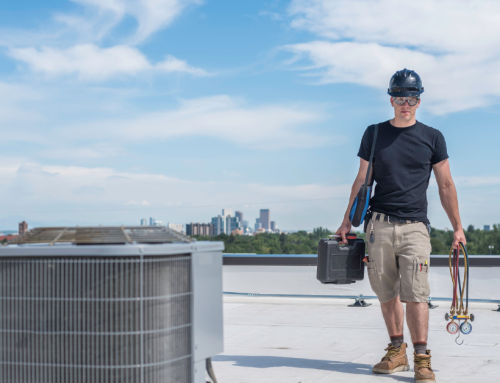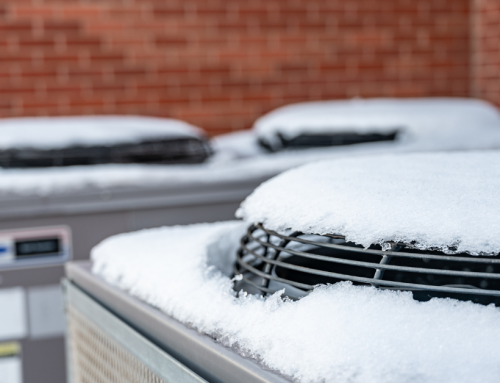Making the best choice is especially important for Colorado homeowners who know all too well that the weather can turn on a dime — from fair and sunny to sub-zero blizzard conditions. When it comes to choosing the right HVAC system, it’s a good idea to first understand how these systems work and why one might be more efficient than the other for your seasonal needs.
Electric Heating Systems
An electric heating system produces heat through electrically-charged heating elements. Basically, it draws in air, which is warmed by internal heating coils. Then, a built-in blower system pushes the warm, heated air through ductwork which distributes it throughout your home.
You can also get a gas-powered heating unit, but many homeowners prefer a traditional electrical heating system for a variety of reasons. One of these reasons is that gas carries the potential risk of leaking carbon monoxide which can result in dangerous fumes in your home. However, this risk is lower if a gas heater is new and/or regularly cleaned and maintained by professionals. Correct installation and proper ventilation are also critically important.
Another reason many homeowners prefer an electric HVAC system is because it’s much easier to install, mainly because it’s not necessary to install a flue (a ventilation duct). Gas heaters, on the other hand, require a flue to draw combustion gases outside.
Heat Pumps
Heat pumps also use electricity but in an entirely different way. While you could say that a traditional furnace system works like a hairdryer as it draws in air and warms it with electric heating elements, a heat pump is different.
A heat pump works more like a refrigerator by extracting heat from outside air then transferring it to a coolant system. Using a condenser unit, it compresses the air which increases the temperature. Air passes over the heated system, increasing and moderating the temperature until it reaches the desired thermostatic temperature for distribution around the home.
Traditional Electric HVAC vs. Heat Pump: Which is Better?
According to energy experts, heat pumps are 200 to 300% more efficient than a traditional electric system. This is mainly because heat pumps actually move and convert existing heat, rather than using electricity to produce it. In this respect, a heat pump can be compared to a refrigerator or air conditioner, which both work on the same principle. If you’ve ever felt the air coming out of an air conditioning window unit, you’ve noticed that it emits hot air. If you turned it around in your living room, the unit would actually heat the room, not cool it.
You wouldn’t want to do this, but it illustrates how heat pumps not only warm but also cool your home and can be used for both heating and air conditioning. And for a climate like Denver’s, which can be scorching hot in the summer and frigid in the winter, a heat pump can provide an economic, one-system solution for all your seasonal needs. In addition, a heat pump is small enough to fit in a closet, making it a space-saving solution as well.
A traditional electric radiant heating system, on the other hand, takes a lot of continuously-flowing electricity to heat a room, and even more to heat a whole house. Whether the system is installed under flooring or as wall-mounted heaters, the amount used is the same. This is an expensive way to heat your home.
However, according to the US Department of Energy, heat pumps can reduce your overall energy use by 20 to 30% and are effective at controlling humidity. In addition, heat pumps have a strong track record for reliability, and they can fit in homes of all different shapes and sizes.
What’s the Best Heat Pump?
The Fujitsu air handler and heat pump is proven to be significantly more efficient and effective than a traditional electric system. That’s because the Fujitsu heat pump does both the heating and the cooling, providing you with a one-system solution for all your comfort needs.
Most heat pumps automatically start their backup heating systems at a temperature of around 30 degrees Fahrenheit, but the Fujitsu can heat down to -5 degrees Fahrenheit before resorting to its backup heat system. This makes the Fujitsu not only more energy-efficient but also more economical to run.
Fujitsu General America has also introduced a new, multi-position air handling system with a design that combines the effectiveness of its side-discharge outdoor units with a streamlined modular indoor design. This new HVAC system saves space and offers high efficiency and quiet operation, so you won’t even know it’s there.
Fujitsu Air Handler/Heat Pump Product Specs
- Capacity range of 24, 30, 36, and 48 kBTU/hr
- 10 HSPF
- All-aluminum indoor unit coil
- High static pressure of up to 1.0inWG
- Modular, streamlined vertical/horizontal design
- Quiet operation — Indoor running as low as 24dBA, and outdoor as low as 53dBA
- Optional factory-provided, field-installed heat kit (up to 15.5kW)
One of the most important things you can do for yourself — and your family — is to invest in a top-notch, trustworthy HVAC system that’s also energy efficient. At Day & Night Mechanical, our specialists have the expertise and knowledge to help you choose the best HVAC system for your home or business.
Whether you need repair work, regular maintenance, a complete overhaul, or a brand new installation, we’re here to provide you with superior HVAC services, all at an affordable cost. Be sure to contact us for more information on how we can improve your quality of life with superior heating and air conditioning products and services.



